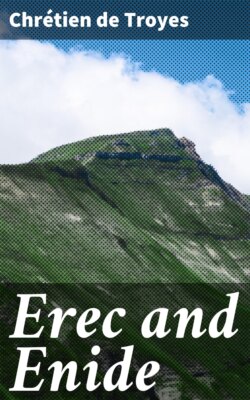Erec and Enide

Реклама. ООО «ЛитРес», ИНН: 7719571260.
Оглавление
Chretien de Troyes. Erec and Enide
Erec and Enide
Table of Contents
INTRODUCTION
Part I: Vv. 1 - Vv. 2292. EREC ET ENIDE (1)
Footnote
Part II: Vv. 2293 - Vv. 4579
Footnote
Part III: Vv. 4580 - Vv. 6598
Footnote
Отрывок из книги
Chrétien de Troyes
Published by Good Press, 2021
.....
Reference has been made to Chretien's use of his sources. The tendency of some critics has been to minimise the French poet's originality by pointing out striking analogies in classic and Celtic fable. Attention has been especially directed to the defence of the fountain and the service of a fairy mistress in "Yvain", to the captivity of Arthur's subjects in the kingdom of Gorre, as narrated in "Lancelot", reminding one so insistently of the treatment of the kingdom of Death from which some god or hero finally delivers those in durance, and to the feigned death of Fenice in "Cliges", with its many variants. These episodes are but examples of parallels which will occur to the observant reader. The difficult point to determine, in speaking of conceptions so widespread in classic and mediaeval literature, is the immediate source whence these conceptions reached Chretien. The list of works of reference appended to this volume will enable the student to go deeper into this much debated question, and will permit us to dispense with an examination of the arguments in this place. However, such convincing parallels for many of Chretien's fairy and romantic episodes have been adduced by students of Irish and Welsh legend that one cannot fail to be impressed by the fact that Chretien was in touch, either by oral or literary tradition, with the populations of Britain and of Brittany, and that we have here his most immediate inspiration. Professor Foerster, stoutly opposing the so-called Anglo-Norman theory which supposes the existence of lost Anglo-Norman romances in French as the sources of Chretien de Troyes, is, nevertheless, well within the truth when he insists upon what is, so far as we are concerned, the essential originality of the French poet. The general reader will to-day care as little as did the reader of the twelfth century how the poet came upon the motives and episodes of his stories, whether he borrowed them or invented them himself. Any poet should be judged not as a "finder" but as a "user" of the common stock of ideas. The study of sources of mediaeval poetry, which is being so doggedly carried on by scholars, may well throw light upon the main currents of literary tradition, but it casts no reflection, favourable or otherwise, upon the personal art of the poet in handling his stuff. On that count he may plead his own cause before the jury.
Chretien's originality, then, consists in his portrayal of the social ideal of the French aristocracy in the twelfth century. So far as we know he was the first to create in the vulgar tongues a vast court, where men and women lived in conformity with the rules of courtesy, where the truth was told, where generosity was open-handed, where the weak and the innocent were protected by men who dedicated themselves to the cult of honour and to the quest of a spotless reputation. Honour and love combined to engage the attention of this society; these were its religion in a far more real sense than was that of the Church. Perfection was attainable under this code of ethics: Gawain, for example, was a perfect knight. Though the ideals of this court and those of Christianity are in accord at many points, vet courtly love and Christian morality are irreconcilable. This Arthurian material, as used by Chretien, is fundamentally immoral as judged by Christian standards. Beyond question, the poets and the public alike knew this to be the case, and therein lay its charm for a society in which the actual relations of the sexes were rigidly prescribed by the Church and by feudal practice, rather than by the sentiments of the individuals concerned. The passionate love of Tristan for Iseut, of Lancelot for Guinevere, of Cliges for Fenice, fascinate the conventional Christian society of the twelfth century and of the twentieth century alike, but there-is only one name among men for such relations as theirs, and neither righteousness nor reason lie that way. Even Tennyson, in spite of all he has done to spiritualise this material, was compelled to portray the inevitable dissolution and ruin of Arthur's court. Chretien well knew the difference between right and wrong, between reason and passion, as the reader of "Cliges" may learn for himself. Fenice was not Iseut, and she would not have her Cliges to be a Tristan. Infidelity, if you will, but not "menage a trois". Both "Erec" and "Yvain" present a conventional morality. But "Lancelot" is flagrantly immoral, and the poet is careful to state that for this particular romance he is indebted to his patroness Marie de Champagne. He says it was she who furnished him with both the "matiere" and the "sens", the material of the story and its method of treatment.
.....